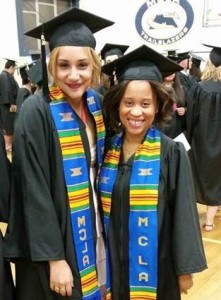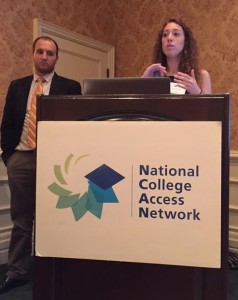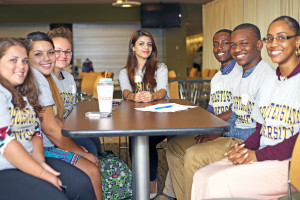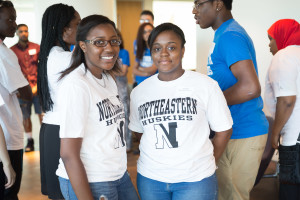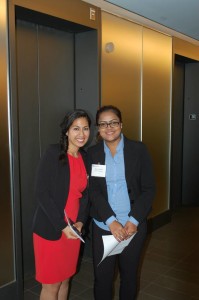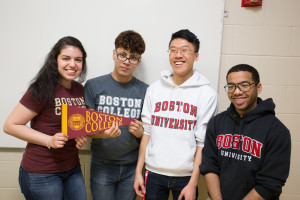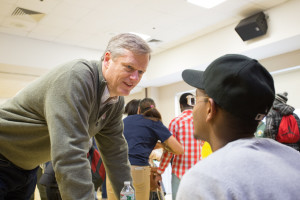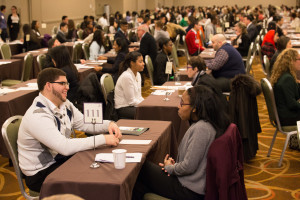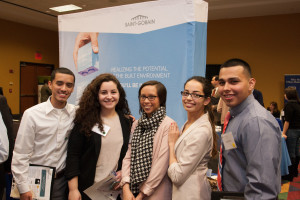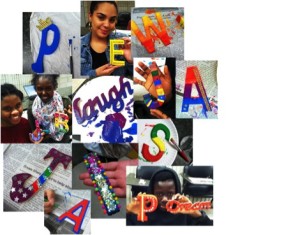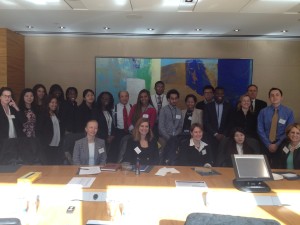
Alcoa executives and Bottom Line students who attended the career event
Every year, January turns into “career month” for our college students at Bottom Line – New York. This month, there were a variety of career events for our nearly 800 college students to attend while they were home on break. In addition to the Go Far Forum, our signature career readiness event that is held annually, we offered a number of smaller career events at the offices of our corporate partners.
One of those events took place at Alcoa, a global leader in lightweight metals technology, engineering and manufacturing. Alcoa CFO Bill Oplinger, a Bottom Line – New York Board member, kicked off the event by reminding students that “where you start won’t be where you end up,” encouraging students to consider jobs that they might not originally have thought about and to stretch themselves professionally – a theme that his colleagues echoed throughout the day.
To learn more about one student’s impressions and takeaways, read Bottom Line student Shaquille Bent’s account of the day and how he plans to apply what he learned at the Alcoa career event going forward.
Name: Shaquille Bent
College: SUNY Buffalo State
College Year: Senior
You’ve been to a few career events with Bottom Line now – how did this one compare to past ones you’ve attended?
This one with Alcoa was extraordinary. In a way, it was more hands-on because we got to interact one-on-one with senior executives at Alcoa from very different departments and hear about their career path. It was unique because I got personal feedback on things that I did well and things that I can improve on during that one-on-one career coaching.
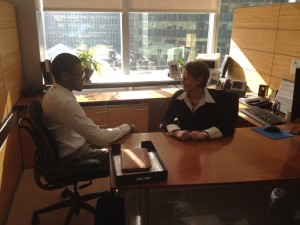
Shaq receiving one-on-one career coaching from one of our Alcoa volunteers
What were some of your favorite parts of the career event at Alcoa?
I did research before the event because I had not previously heard of Alcoa. So, it was great to learn more about a company that I didn’t know about before. I really enjoyed hearing about people’s career paths, and I learned that what you study in college does not necessarily determine what type of job you get. My favorite part was the one-on-one conversation with Guru (an Alcoa employee), because he had a similar career path to the one I want. He studied mechanical engineering; I’m studying industrial technology. He also has a MBA, and I’m interested in obtaining one too.
What was the most intimidating or most challenging part of the event for you?
I don’t feel like there was a really intimidating part because Bottom Line has helped me really prepare for events like these. If I were still a freshman, I probably would have been much shyer and not known how to interact with everyone. I definitely wanted to make a good impression on the Alcoa executives, though!
What were some of your key takeaways?
First, I remember Sue (another volunteer from Alcoa) saying how important it was to “make sure you stretch yourself and go after all opportunities.” Guru said the same thing – to look into opportunities outside of the state where you live, to be flexible, to take risks, and do things out of the ordinary. All of the Alcoa employees that we met with have achieved professional success; they inspired me to want the same for myself.
Second, Daniel from Alcoa said that you need to find mentors and keep relationships alive. That was really important for me too. I feel like I’ve started to do that, but I’ve struggled with how to keep the relationship alive. They gave us some specific examples for what to do, like sending an email every now and then just to check in, so that you can build “a repository of advocates” as Daniel said.
What types of careers are you considering, and how did this event help you prepare for them?
I’m thinking long-term about becoming a project director or project manager. Right out of college, I think I want to be an analyst somewhere and gain experience in the business world. I can then interact with professionals as well as other project managers and learn from them. Down the line, I also want an MBA.
This event helped me prepare for that by learning about other successful business professionals’ career paths. They shared their stories about how they got to where they are. They all had very different paths, so I realized that you have to be open to all opportunities because you never know where they might lead.
Any advice for students who are graduating from college soon and starting to make plans for their careers?
One thing that I’ve learned throughout my college career is that you have to network. Networking can open up a whole range of opportunities that you never thought existed.
You also have to find mentors and keep the relationship alive. You can learn a lot from mentors because they have lots of experience and the knowledge that they share with you can help you find a career.
